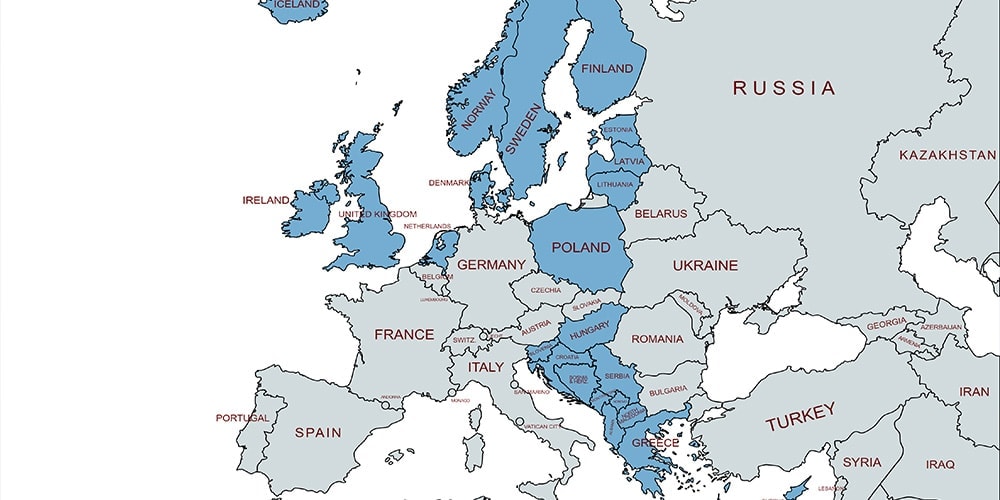
Trans-European Division (TED) leaders said they are excited about a new strategic framework for the territory that was voted as a working document on March 28, 2021. It focuses on plans for mission from April 2021 until the 2025 General Conference Session and beyond.
Introducing the document, TED President Raafat Kamal said, “The passion for distinctively Seventh-day Adventist mission needs to impel everything done by the Trans-European Division, by its 11 unions and three attached fields, through to its nearly 90,000 members.”
Kamal added that the strategic framework “is intended to help Adventists within the TED territory to renew our Adventist identity that speaks to the challenges of the 21st-century world, and to renew, in this century, the passion for mission of past generations.”
The 24-page document then develops a framework in eleven key areas stretching from Mission, Identity, and Evangelism, through Spiritual Growth, Leadership Development, and Disciple-Making, to issues of Diversity and the appropriate training of pastors and leaders in the context of European culture and its spiritual needs. It is based upon the General Conference (GC) strategic plan, “I Will Go,” but contextualized for Europe.
Gábor Nagy from Hungary is a lay member and one of the 36 members of the TED Executive Committee who met to discuss and review the document. He said, “I really appreciate that we have accepted the main global GC strategic plan. We are a global church, so I think the framework should be reflected in every level of the organization. It's great that we have a few additions on the TED level.”
Reflecting on the particular challenges of the past year, Marius Radosh, a lay representative from Poland, noted that “each organization is tested in times of crisis.” He added, “Being well prepared and adapted to the new pandemic and post-pandemic situation, the strategy helps us go through difficult times as a winner.”
Impossible to Implement?
The committee is a mixture of lay members, union presidents, church pastors, TED officers, and directors. One of those is Ian Sweeney. Having spent 10 years as president of the British Union Conference (BUC), Sweeney is realistic about what committees and plans achieve.
“At first reading, and possibly because of too many years dealing with problems as an administrator, I felt that several of the recommendations were going to be impossible to implement. On further reflection, however, I see these same ‘impossible’ recommendations as wonderful opportunities for our church in the TED and the BUC.”
One of those “wonderful opportunities” is in the area of pastoral needs and training. The division’s Newbold College of Higher Education is changing as a training college to equip both spiritually gifted individuals, men and women alike, and worshipping groups across the TED to participate dynamically and fruitfully in ministry and mission. The redesigned curriculum will enable it to be a positive source of ethical and effective leaders, committed pastors, disciple-makers, and church planters. The “new” Newbold aims to combine excellence in scholarship with training that is highly practical and mission focused. It will also reflect the diversity of the church across the entire division.
This is exciting for Ivo Kläsk, president of the Baltic Union. “I find it most helpful that we are working with a renewed focus on training pastors for our fields and that we are working together towards influencing the understanding of the role of a pastor,” he said. “A pastor is the key in the church body, directing and equipping the church mission and discipleship on the grassroots level.”
Engagement Is Key
The aim for pastors, lay leaders, and church members is Transformative, Effective Disciple-making. At the division level, this means an even stronger emphasis on team working, with directors working even more closely together to enhance training, resources, and effectiveness. This was a concept first introduced in 2015. Now the aim is to increase the effectiveness of such cross-fertilization.
“It’s not so much the headings of the plan, for instance — spiritual growth, a church of refuge, mission identity, and evangelism — but more the focus and descriptions on ways to engage with our members, local communities, and especially young people,” Christine Burt, a lay representative from the BUC, explained. Along with many on the committee, she noted that “young people are crucial for church growth and during COVID, church engagement has often been challenging. The media and online ministry and Church of Refuge areas of the plan have many suggestions for engaging the youth.”
Hilde Huru, a lay member from Norway, sees the focus on retaining young people in the church and emphasizing training and educating pastors and members as very useful. “Especially interesting,” she said, “is making continuing pastoral education more systematic and mandatory.” She would also like to see the TED working with unions on a series of Bible and Mission conferences — ideally with topics being selected according to local needs.
Rooting Out Racial Biases
Huru also noted the strong emphasis on rooting out any cultural or racial biases from the church. “It is not enough for leaders not to be racist or nationalist or biased in any way, but that we need to be purposefully anti-racist and have systems in place to make us override our unconscious biases.” This includes the hiring process, where she recommended ensuring that “TED Ethical Employment Policies are established and used as standard practice in all units of denominational structure and institutions.”
Sweeney agreed but noted that the diversity issue needs to look at external mission within the church community. With the BUC possibly having the most diverse membership in Europe, he said that “the recommendations would allow our church to share and celebrate our internal diversity and consequently be better equipped to reach our diverse communities and neighborhoods.”
The entire strategic framework is available on the TED website.
The original version of this story was posted by the Trans-European Division news site.